In Norse mythology, no one was more creative or well spoken than the Aesir god Bragi. He was the god of poetry and music as well as eloquence. A son of Odin and the jötun maiden Gunnlöd, he was blessed with creativity at birth. His wife is the goddess Idunn, keeper of the apples of immortality.
Bragi Key Facts
| Parents | Odin and Gunnlöð (jötun daughter of Suttungr), or possibly Frigga |
| Partners | Idunn |
| Siblings | Balder, Hodr, and others |
| Offspring | None known |
| Tribe | Aesir |
| Old Norse name | Bragi |
| Other names | None known |
| The God of | Poetry, Eloquence, and Music |
| Ass. Animal | Harp |
Name and Etymology
Bragi, pronounced /ˈbrɑːɡi/ and written in Old Norse as [ˈbrɑɣe], holds the esteemed title of the skaldic god of poetry in Norse mythology. That’s why this name found its place on our list of most popular Viking names for boys.
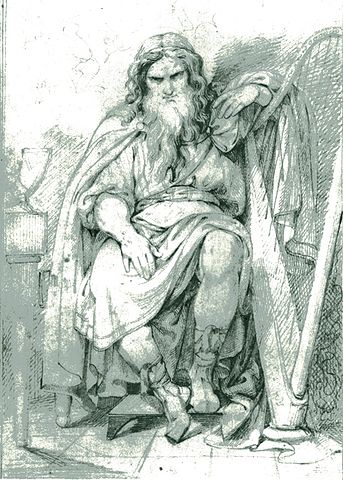
The etymology of the name “Bragi” is intriguing. It likely originates from the Old Norse masculine noun “bragr.” This term can be interpreted in two distinct ways. On one hand, “bragr” translates to ‘poetry’ in Old Norse, akin to the Icelandic “bragur,” which means ‘poem, melody, or verse.’
On the other hand, “bragr” can also signify ‘the first’ or ‘noblest,’ reminiscent of poetic Old Norse terms like “bragnar,” meaning ‘chiefs or men,’ and “bragningr,” denoting ‘king.’ The exact semantic derivation of the theonym “Bragi” remains a topic of debate among scholars: does it stem from the realm of poetry or from the notion of nobility and prominence?
Kennings for Bragi
In the Skáldskaparmál ch. X, Bragi is described through various kennings, which are poetic metaphors used to provide alternative names or descriptors for an entity. Bragi can be periphrased as the “Husband of Idunn,” highlighting his significant relationship with the goddess of youth. He is also referred to as the “First Maker of Poetry,” emphasizing his foundational role in the realm of Norse poetic arts. Another kenning, the “Long-bearded God,” draws attention to his distinctive physical feature, and it’s noted that any man with a prominent beard might be called “Beard-Bragi” in his honor. Lastly, recognizing his divine lineage, he is termed the “Son of Odin.” These kennings not only provide alternative ways to refer to Bragi but also shed light on various facets of his identity and significance in Norse mythology.
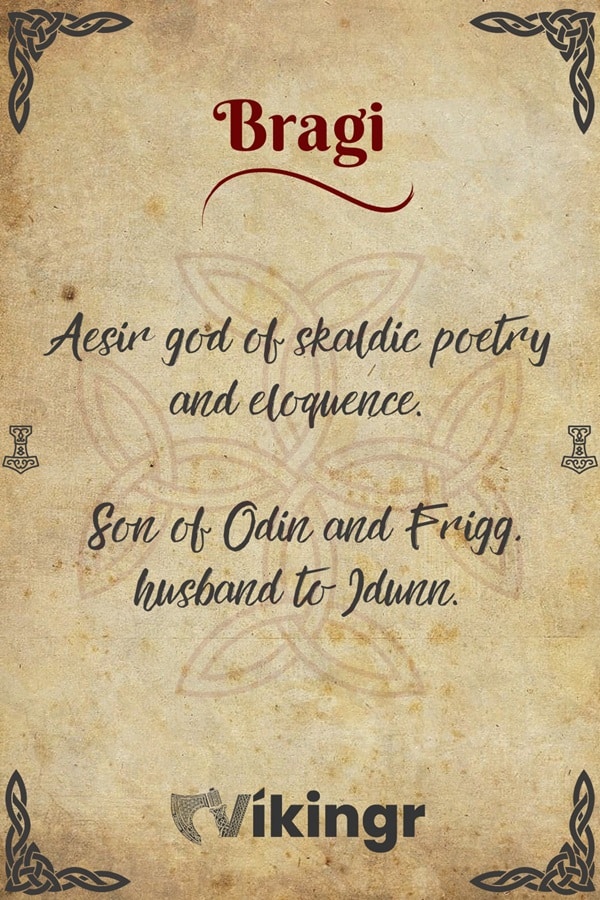
Ancient roots
Bragi’s prominence is most evident in Norse mythology. However, an intriguing theory suggests that the god Bragi might have been inspired by a historical figure. This figure, a mortal bard named Bragi Boddason, was renowned for his poetic prowess. Legend has it that after his death, due to his exceptional skills, he was elevated to the status of a “court skald” in Valhalla, the hall of the slain warriors. This transformation from a mortal skald to a divine figure, might have laid the foundation for the Bragi the god. This captivating theory will be delved into more deeply in a subsequent chapter.
Bragi’s Origins
Born to Odin, the all-father, and possibly the giantess Gunnlöd, Bragi was destined for greatness from the start. While some sources hint at Frigg as a potential mother, Gunnlöd is more commonly recognized in this role. Bragi’s siblings, each with their own distinct characteristics and tales, played significant roles in the Norse myths:
- Baldur: Often described as the most beloved among the gods, Baldur is the god of light, purity, and beauty.
- Heimdall: The vigilant guardian of the Bifröst bridge, Heimdall possesses keen senses and is known as the watchman of the gods.
- Hermod: The brave messenger of the gods, Hermod is best known for his journey to Hel to retrieve his brother Baldur.
- Hodr: The blind god of darkness and winter, Hodr unwittingly played a tragic role in the death of Baldur.
- Meili: Though lesser-known, Meili is recognized as one of Thor’s brothers and is associated with travel or exploration.
- Thor: The thunder god and protector of mankind, Thor wields the mighty hammer Mjölnir and is renowned for his battles against the giants.
- Tyr: The god of war and justice, Tyr is known for his bravery, especially during the binding of the wolf Fenrir.
- Vali: Born for the sole purpose of avenging Baldur’s death, Vali is a symbol of swift justice and retribution.
- Vidarr: Known as the silent god, Vidarr is associated with vengeance and is predicted to survive Ragnarok.
With such a diverse and powerful lineage, Bragi’s place among the Aesir was both prominent and revered. As the god of poetry and eloquence, he added a unique flavor to the rich tapestry of Norse deities.
Bragi’s Family and Relationships
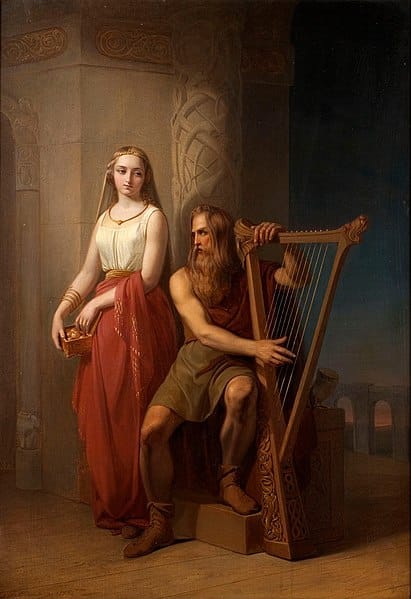
Bragi’s most notable relationship was with Idunn, the goddess of youth and immortality. Idunn is not just any goddess; she is the keeper of the magical apples that grant the gods immortality. Without her and her sacred apples, the gods would age and wither. Their union was symbolic, representing the harmonious blend of eternal youth (Idunn) and artistic expression (Bragi). The intertwining of their roles—Bragi’s poetic eloquence and Idunn’s life-sustaining apples—highlighted the importance of both in the grand scheme of Norse mythology.
Children
While many gods in the Norse pantheon had numerous offspring, there are no known children attributed to Bragi and Idunn. Their relationship, it seems, was more focused on their individual roles and the synergy between them.
Bragi’s Role And Depiction
Bragi was not just any god; he was the embodiment of poetic inspiration. With his great beard, a feature so prominent that it led to the kenning “the Long-bearded God,” Bragi was a figure of wisdom and ageless knowledge. Among the gods, he was the voice, the bard who sang of their deeds and adventures. For humans, he was a beacon of creativity, inspiring skalds (poets) to craft verses that would be sung for generations.
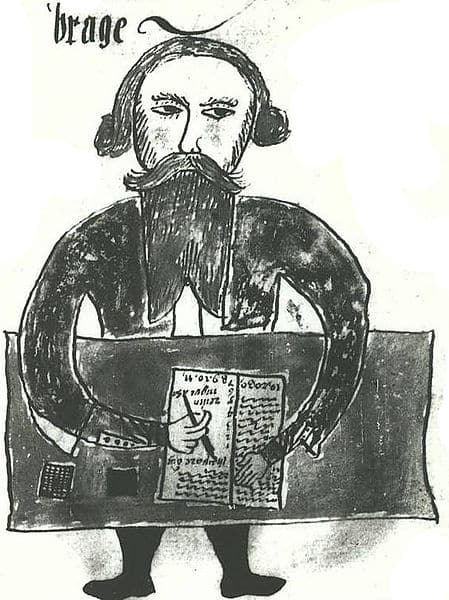
In the grand halls of Valhalla, Bragi had a special role. According to skaldic poems, he was one of the primary entertainers of the Einherjar, the fallen warriors chosen by the valkyries. His songs and tales would provide both solace and entertainment to these brave souls. Furhtemore reminding them of their valorous deeds and the glory of the battle yet to come.
Moreover, Bragi wasn’t just a passive observer in Valhalla. He played an active role in welcoming esteemed newcomers to the hall. A notable instance is described in the poem “Hákonarmál.” Hákon the Good, after his death, is escorted to Valhalla by the valkyrie Göndul. Recognizing the significance of Hákon’s arrival, Odin dispatches Hermóðr and Bragi to greet him. This honor further shows Bragi’s esteemed position among the Aesir gods and his role in the afterlife’s ceremonies.
His personality, as gleaned from the myths, was one of wisdom and eloquence. He wasn’t a warrior god. Instead, his battles were fought with words, and his victories were tales that enthralled all who heard them.
Bragi’s Symbols and Artifacts
Bragi’s deep connection to the harp is evident in many depictions of him. This instrument however, with its delicate strings and resonant sound, is more than just a symbol. It’s an extension of Bragi’s very essence. As the god of both poetry and music, the harp serves as a bridge between these two art forms. Further allowing Bragi to weave words and melodies seamlessly. In many Norse artworks and carvings, Bragi is often shown playing the harp.
Another distinguishing feature of Bragi is his prodigious beard. This long, flowing beard is both a mark of age and wisdom, as well as a sign of his status as the premier skald of the gods. It sets him apart, making him instantly recognizable and reinforcing his association with the ancient and revered tradition of storytelling.
Perhaps one of the most intriguing aspects of Bragi’s symbolism is a mention of runes carved onto his tongue. These runes are believed to either be the source of Bragi’s unparalleled eloquence or a testament to it. The very idea of having the power of runes on one’s tongue underscores the weight and impact of Bragi’s words. Furthermore, also suggesting that his poetic expressions were not just art but also magic in their own right.
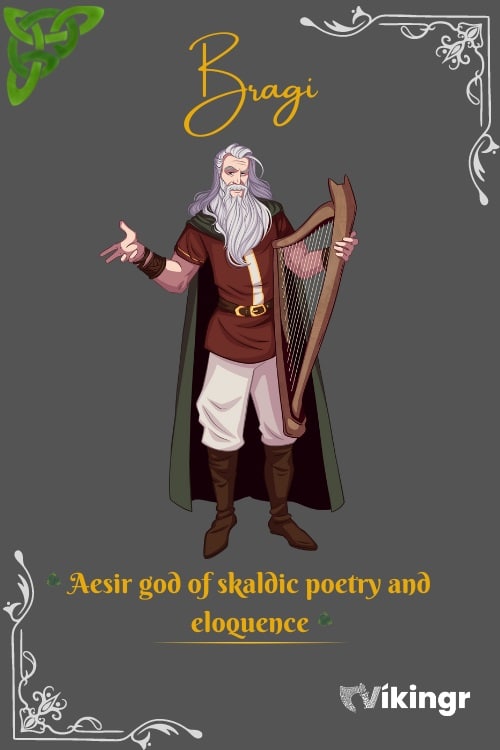
Play Fun Norse Quiz
Is this article making you even more curious about Norse gods and goddesses? You can satisfy your curiosity by playing a fun Norse mythology quiz. This way, you can test your knowledge about Norse gods and goddesses, as well as fill in some gaps. Good luck and have fun playing!
You might be interested in this fun game too! It reveals the parentage of Bragi and other sons (and daughters) of Odin:
Don’t forget to try our other games as well!
Myths about Bragi
Bragi’s tales, while not as action-packed as some other gods’, are deeply rooted in the art of storytelling and eloquence. One of the most notable instances is his role in the Skáldskaparmál. Here, Bragi takes on the role of a narrator during a banquet at Aegir’s hall. As the god of poetry, he engages in an extensive dialogue with Aegir. In the story he is recounting various tales and weaving stories with his words. This banquet, while not a traditional myth, showcases Bragi’s central role in Norse mythology as the chief storyteller. Snorri cleverly use Bragi as a vehicle for the story he want to tell, adding depth to the narrative.
Lokasenna and Bragi’s Altercation with Loki
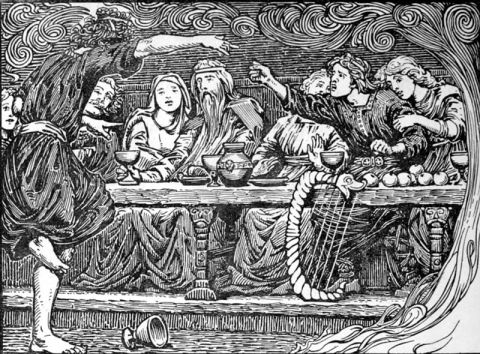
In the Lokasenna, a poem from the Poetic Edda, Bragi finds himself in a tense altercation with Loki. The two exchange sharp words, with Bragi standing his ground against the trickster god. This exchange not only places Bragi squarely within this mythological poem but also hints at another, possibly lost tale.
Lost Myth of Bragi and Idunn’s Brother
From their exchange in the Lokasenna, we gather a reference to Bragi having killed Idunn’s brother. This allusion is intriguing because there’s no detailed account of this event in any known Norse texts. Such references are vital clues, suggesting that there are myths that have been lost over time. Personally I find it really interesting, it’s part of the mystery that is Norse mythology.
Runes on Bragi’s Tongue
Another fascinating aspect of Bragi’s lore is detailed in the Sigrdrífumál, another poem from the Poetic Edda. It describes runes being carved on various objects and beings, including Bragi’s tongue. These runes, sacred symbols in Norse culture were later distributed among the Aesir, Elves, Vanir, and Men. The runes were said to encompass speech, birth, ale, and magic. The act of carving runes on Bragi’s tongue further emphasizes his role as the god of eloquence and poetry. The exact meaning behind this ritual remains enigmatic, but it undoubtedly adds another layer of mystique to Bragi’s character.
Bragi’s Role in Ragnarok
During Ragnarok, the cataclysmic end of the world in Norse mythology, Bragi’s role is not known. Moreover, nothing is said about him surviving it, so likely he perished with most of the other gods.
Bragi In Old Norse Religion
Worship of Bragi was intertwined with the reverence for poetry and music. Skalds, the poets of the Norse world, would often invoke Bragi’s name before reciting their verses. In that way seeking his blessing and inspiration. Artifacts from the Viking Age depict Bragi with his iconic harp, a testament to his enduring influence.
Mentions in Ancient Texts
Prose Edda
Gylfaginning
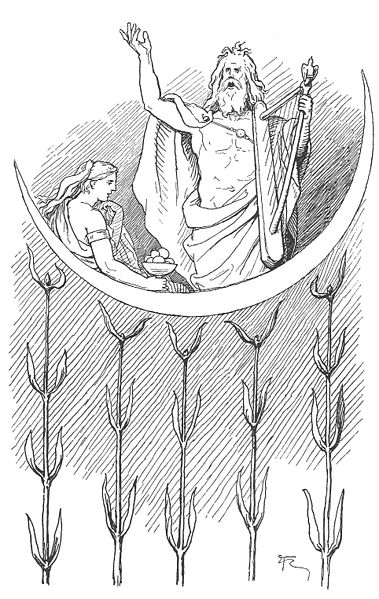
In the Gylfaginning, Snorri Sturluson describes Bragi’s esteemed position among the gods. He writes:
“One is called Bragi: he is renowned for wisdom, and most of all for fluency of speech and skill with words. He knows most of skaldship, and after him skaldship is called bragr, and from his name that one is called bragr-man or -woman, who possesses eloquence surpassing others, of women or of men. His wife is Iðunn.”
Skáldskaparmál
The Skáldskaparmál offers a dialogue between Ægir and Bragi about the nature of poetry, especially skaldic poetry. Bragi delves into the origin of the mead of poetry and its association with the blood of Kvasir. He also discusses various poetic metaphors known as kennings. Snorri writes:
“How should one periphrase Bragi? By calling him husband of Iðunn, first maker of poetry, and the long-bearded god (after his name, a man who has a great beard is called Beard-Bragi), and son of Odin.”
Poetic Edda
Lokasenna
In the Lokasenna, Bragi’s altercation with Loki is highlighted. The poem captures their tense exchange, with Bragi standing firm against Loki’s provocations. The poem reads:
“In that poem Bragi at first forbids Loki to enter the hall but is overruled by Odin. Loki then gives a greeting to all gods and goddesses who are in the hall save to Bragi.”
Sigrdrífumál
The Sigrdrífumál from the Poetic Edda describes the engraving of runes on various objects and beings, including Bragi’s tongue. The poem states:
“A passage in the Poetic Edda poem Sigrdrífumál describes runes being graven on the sun, on the ear of one of the sun-horses and on the hoofs of the other, on Sleipnir’s teeth, on bear’s paw, on eagle’s beak, on wolf’s claw, and on several other things including on Bragi’s tongue.”
Skaldic Poems
Eiríksmál and Hákonarmál
In both the Eiríksmál and Hákonarmál, Bragi’s role in Valhalla is emphasized. He is depicted as greeting those who enter, showcasing his eloquence and mastery of poetry. In the below passage, he is mentioned as Odin prepares for the resception of the great vikingr warrior king Eric Bloodaxe. The poems mention:
“In the poem Eiríksmál Odin, in Valhalla, hears the coming of the dead Norwegian king Eric Bloodaxe and his host, and bids the heroes Sigmund and Sinfjötli rise to greet him. Bragi is then mentioned, questioning how Odin knows that it is Eric and why Odin has let such a king die.”
These mentions, both in the Prose and Poetic Edda, paint a vivid picture of Bragi’s significance in Norse mythology. Moreover emphasizing his eloquence, wisdom, and central role in the myths of the Vikings.
The Evolution of Bragi: From Mortal Skald to God of Poetry
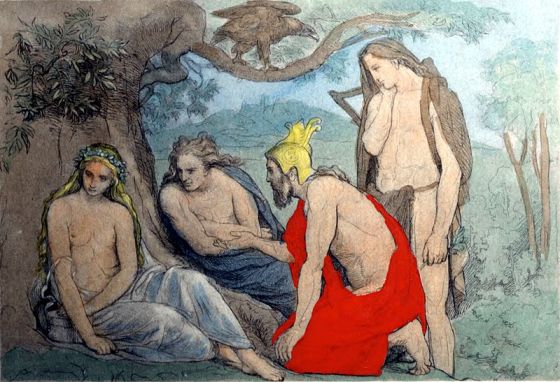
The Norse pantheon, rich with gods and goddesses of various domains, also presents us with a unique figure: Bragi. The origins and evolution of Bragi’s character in Norse mythology have been a subject of much debate and intrigue. Was Bragi, the god of poetry, originally a mortal skald named Bragi Boddason? How did a human poet ascend to the status of a deity?
Bragi Boddason: The First Skaldic Poet
Bragi Boddason, often referred to as Bragi the Old, holds a special place in the annals of Norse history. He served under several Swedish kings, including Ragnar Lodbrok and Östen Beli, as well as Björn at Hauge. During the 9th century, Bragi’s poetic prowess was unparalleled. His famous poem Ragnarsdrápa was a tribute to the legendary Viking Ragnar Lodbrok. The verses there are so evocative that they paint vivid images of Norse myths. Far ranging, from Thor’s fishing expedition for Jörmungandr to the eternal battle between Hedin and Högni.
The Transition to Valhalla
Bragi’s poetic genius was such that subsequent generations believed that upon his death, Odin appointed him court poet of Valhalla. In that great hall, where elite warriors resided, it was only fitting they would have the greastest skald. This belief was further solidified by the notion that Bragi’s poems were not just artful but also divinely inspired.
Bragi: The Deified Poet
By the Christian Middle Ages, Old Norse writers had elevated Bragi to the status of a god of poetry. Some even suggested that Bragi’s name inspired the Old Norse term for “poetry,” bragr. To further cement his divine status, Bragi is married to the goddess Idunn, the keeper of the apples of immortality.
The Debate: Mortal or Deity?
The distinction between Bragi the god and Bragi Boddason the skald is evident in Snorri Sturluson’s writings. Snorri clearly differentiates between the two. However, the appearance of Bragi in the Lokasenna, and Frigga’s small slight, blurs the picture a bit.
Either way, that Bragi possibly evolvled from a mortal to a god shows the importance of storytelling in Norse culture. The stories we can be fascinated by and enjoy today, have been passed down, told and retold thousands of times. Having crossed that chasm of time, Bragi’s legacy as the voice of Valhalla and the god of poetry remains undiminished.
Frequently Asked Questions
Bragi is revered as the god of poetry, eloquence, and music in Norse mythology.
Bragi’s partner is Idunn, the goddess of youth and immortality.
There are no known children attributed to Bragi and Idunn.
The harp is closely associated with Bragi, symbolizing his mastery over music and poetry.
During Ragnarok, Bragi played the role of a chronicler, documenting the events of the cataclysm.

Hi, very good article, but two things I do want to point out for correction. To preface I’ve been studying Norse mythology for almost 20 years now, and so I’ve read close to a hundred or so resources on it. This includes translations, professional interpretations, and scholarly articles. Happy to list ones relevant to this topic.
In none of these is Bragi ever at Ragnarok, and Gunnlod is not referenced as his mom even once in traditional sources. Both of these are recent inventions that very unfortunately caught on, I believe Rydberg presented the Gunnlod one, along with dozens of other falsehoods. His presence at Ragnarok is from a fantasy novel that I can’t recall the name of.
I’m in no way doubting your knowledge in this, the Gunnlod Theory is a special poison that’s seeped its way into a lot of professional works and confuses even the best of us. As I hope people find this article among others for info, I wanted to point this out in the hopes we can start correcting this common misinformation! Cheers!
Hey Josh, much appreciated! For sure will dive into an update on this. Definitely want to convey what actual knowledge we have, and not take part in spreading invented theories. Cheers! /m